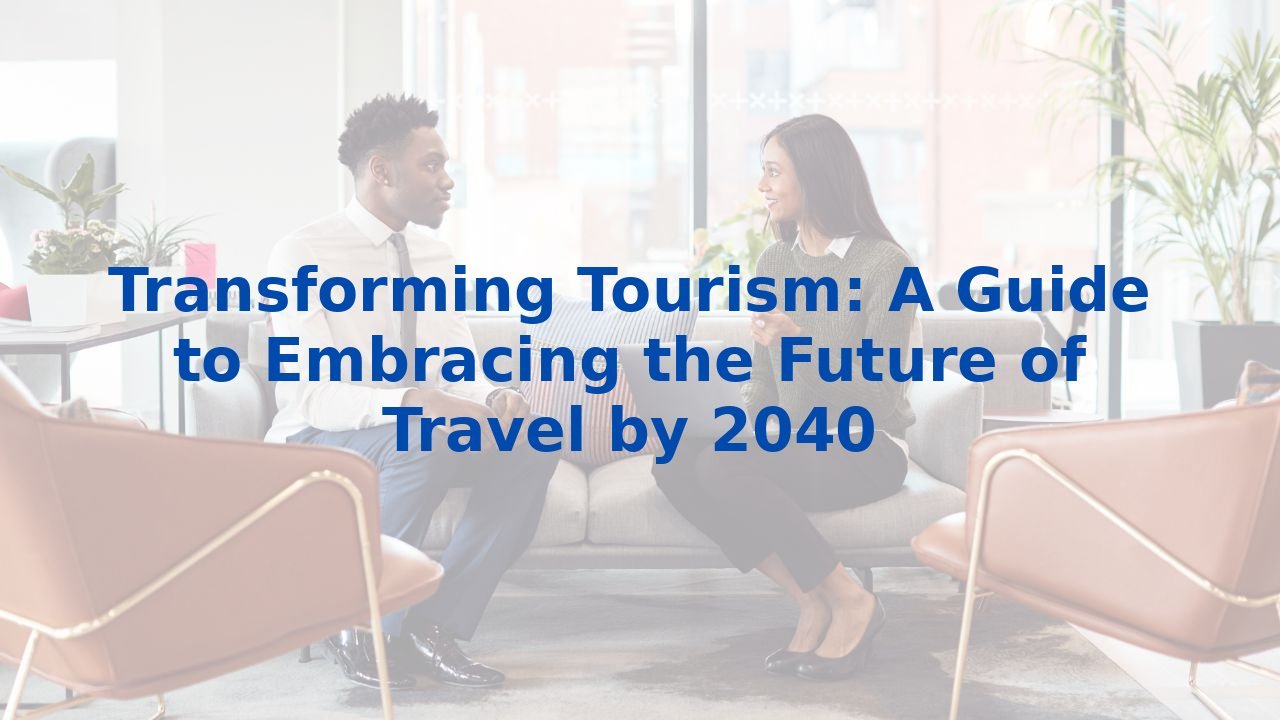Transforming Tourism: A Guide to Embracing the Future of Travel by 2040
Transforming Tourism: A Guide to Embracing the Future of Travel by 2040
The travel landscape is on the brink of a profound transformation. As we look forward to 2040, it becomes increasingly clear that artificial intelligence (AI) will play a crucial role in reshaping how we travel, explore, and connect with the world. By embracing AI, the tourism industry can enhance operational efficiencies, innovate service offerings, and elevate the overall travel experience. In this blog post, we will explore how AI can revolutionize key business processes within the tourism sector.
Enhancing Tourism Business Processes with AI
Automation of Repetitive Tasks
For many businesses in the tourism sector, repetitive tasks can consume valuable time and resources. From booking management to customer inquiries, these activities often dilute the time employees have to focus on customer engagement and strategic initiatives. AI offers robust automation solutions that streamline these processes. For instance, intelligent chatbots can handle customer inquiries 24/7, allowing staff to dedicate more time to personalized service and meaningful interactions.
Advanced Data Analytics
In tourism, data is the new currency. With the ability to analyze vast amounts of information—such as traveler preferences, seasonal trends, and booking patterns—AI can uncover valuable insights that drive more informed decision-making. By implementing advanced data analytics, tourism businesses can better tailor their offerings to meet traveler demands. Demand forecasting becomes sharp and precise, enabling companies to optimize inventory and enhance the visitor experience.
Personalized Customer Experience
The modern traveler craves personalization. With AI, the tourism industry can offer tailored experiences that resonate with individual preferences. Utilizing AI algorithms, businesses can curate personalized itineraries, recommend relevant activities, and even adjust services in real-time based on customer interactions. This level of customization not only boosts customer satisfaction but fosters loyalty and encourages repeat business.
Innovation and Product Development
In an era where attention spans are short, innovation is paramount. AI can catalyze product development in the tourism sector by optimizing design processes and predicting market trends. Tourism companies can benefit from rapid prototyping and testing of new services—whether it's a novel travel app or a unique tour package—ensuring they remain at the forefront of industry trends.
Security and Risk Management
As digital transactions become the norm in travel, ensuring customer data security is critical. AI offers cutting-edge solutions for threat detection and fraud prevention, safeguarding both the business and its customers. By utilizing AI's capabilities in identifying suspicious behaviors and responding promptly to potential threats, businesses can deepen customer trust and uphold a reliable reputation.
Benefits of AI for Improving Efficiency
Time and Resource Savings
AI not only drives efficiency but also liberates resources. By automating mundane tasks, tourism businesses can reallocate staff towards more strategic initiatives, ultimately enhancing workplace productivity. This shift allows employees to engage in revenue-generating activities that foster growth.
Enhanced Decision-Making
With real-time insights, AI helps managers make better strategic choices. Whether predicting shifts in consumer behavior or identifying potential risks, the agility provided by AI analytics is invaluable. Businesses that leverage these insights can anticipate market demands and pivot strategies swiftly to capture new opportunities.
Improved Customer Service
AI-powered tools can elevate customer interactions by providing real-time assistance and support. With the capability to address inquiries at any hour, brands can enhance overall traveler satisfaction. Furthermore, freeing human representatives from routine queries allows them to tackle more complex issues that require nuanced understanding and human touch.
The Importance of Training Employees for AI
The transition to an AI-driven organization is not solely about the technology; it is deeply tied to the people who wield it. Investing in employee training ensures that your workforce can effectively collaborate with AI systems and leverage their capabilities. Here are some key aspects of training:
Upskilling Workforce
Providing employees with AI-related training equips them with the tools to maximize technology's benefits. By fostering a culture of continuous learning, organizations ensure that their teams are adaptable and ready to embrace new challenges that AI entails.
Adaptation and Integration
Training helps employees integrate AI tools seamlessly into their daily routines. Understanding how to leverage AI for various tasks—be it using data analytics for customer insights or employing chatbots for service—empowers staff to work more efficiently and effectively.
Enhanced Collaboration
When employees are knowledgeable about AI, it paves the way for collaboration across departments. Recognizing how AI can support different functions fosters teamwork, ultimately leading to better alignment and success in achieving organizational goals.
Conclusion
The tourism industry stands at the cusp of revolutionary change propelled by AI. From automating tasks and refining decision-making processes to personalizing guest experiences, the benefits of AI adoption are clear. However, success hinges not just upon technology but also upon training employees to harness AI's potential effectively. As we journey toward 2040, businesses ready to integrate AI into their operations will enhance their competitive edge in the evolving travel landscape.



